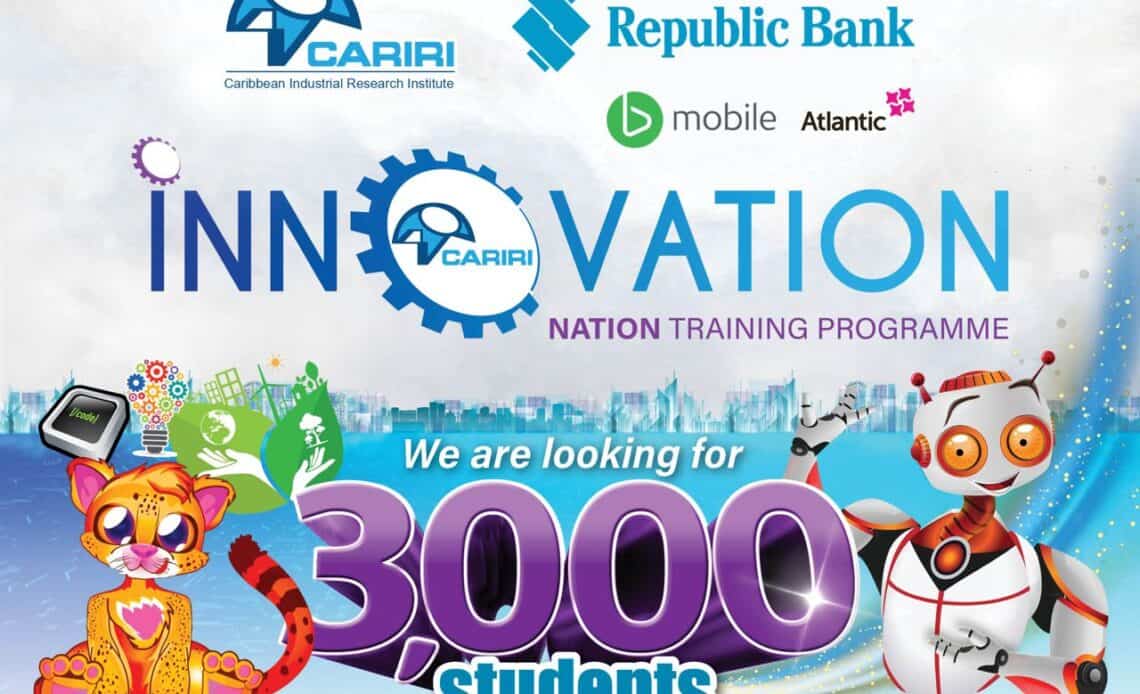
More than three thousand students will spend their July/August vacation learning data analytics, coding, innovation and other topics that will help prepare them for the jobs of tomorrow. CARIRI’s Innovation Nation Training Programme will create a groundbreaking and immersive educational opportunity that will expand on the students’ education and equip them with skills necessary for key industries of the future.
The programme expands on the established and esteemed Coding and Innovation Programme, which was introduced in 2021. It takes heed of the United Nations Sustainable Development Goals and has added a new module, Climate Action. With the support of brand partners including bmobile, the programme will also continue two of the well-known modules – Science, Technology, Engineering, Arts and Mathematics (STEAM) as well as Coding, Innovation, and Entrepreneurship.
Embracing a multi-disciplinary learning approach, CARIRI will guide participants using a self-paced, virtual approach which provides flexibility for students across Trinidad and Tobago to complete the programme at their convenience.
Hans-Erich Schulz, CEO of CARIRI said the organisation is pleased to collaborate with corporate entities to deliver exceptional value for the students.
“CARIRI has successfully executed ICT educational programmes in Trinidad and Tobago since 2018 and at the end of this cycle we would have trained well over 7,500 students with great success and with the support of bmobile, and other corporate entities,” Schultz said.
“We will be educating participants on the emerging concepts from an industry standpoint to showcase and highlight the career paths which can be pursued. We are also excited about the grand finale – the PowerUp! Competition which always proves to be popular with the students as they can showcase what they have learned over the course of the programme,”
The PowerUp! Competition held in August, challenges students to apply their newfound knowledge and skills to create innovative solutions to address societal issues.
Gerard Cooper, General Manager of Operations and Administration, TSTT noted that the company has long supported CARIRI in various incarnations of this programme as it brings together much of what the local telecommunications provider believes in. “We are always working to align with initiatives that can deepen the development of our young people particularly in areas of technology and digitalisation.
As the de facto technology partner in the development of T&T, we are proud to see so many students learn and deepen their understanding of areas in entrepreneurship, coding and STEAM industries too.” Cooper commended the continued work at CARIRI and encouraged students to apply.
This year’s programme is based around the United Nations Sustainable Development Goal 4 (Quality Education) and Goal 13 (Climate Action). The STEAM track presents an exciting fusion of Coding and Astrophysics, Coding and Digital Music, Data Science, Dashboards, and Mobile Apps. For those following the Innovation and Entrepreneurship track, students will have the opportunity to refine their innovative thinking, while also learning the fundamentals of transforming their ideas into tangible business ventures through age-appropriate business canvas models.
The Climate Action module offers high-quality awareness training in sustainability, energy audits, carbon foot-printing, and solar PV (photovoltaic) systems; empowering students to adopt energy-conscious mindsets and engage in energy conservation practices.
‘STEAM skills are the essential building blocks of the 21st century,’ according to CARIRI. Additionally, the World Economic Forum predicts that by 2025, automation and AI will create 12 million new jobs, primarily in fields such as data analysis, software development, and AI implementation. The U.S. Bureau of Labor Statistics projects that employment in STEAM occupations will grow by 8% from 2020 to 2030, faster than the average for all occupations.
This growth is driven by increased demand for STEAM professionals in fields such as computer science, healthcare, and engineering. Not to be outdone for those choosing the Climate Action track for learning, the Global Commission on the Economy and Climate estimates that investing in climate-related sectors, such as renewable energy, energy efficiency, and sustainable transport, could generate $26 trillion in economic benefits and create more than 65 million new jobs by 2030.
For more information and registration, visit the site. Registration opened on 29th May 2023 and will be on a first come, first serve basis.

